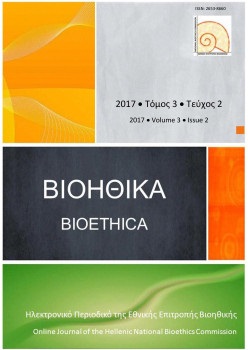Νέες προκλήσεις για το δίκαιο της ιατρικά υποβοηθούμενης αναπαραγωγής: Το νέο σύμφωνο συμβίωσης και η σχεδιαζόμενη ρύθμιση για την αναγνώριση ταυτότητας φύλου
Abstract
Η παρούσα εργασία επικεντρώνεται στο νέο σύμφωνο συμβίωσης με αφετηρία την απόφαση της 7.11.2013 του ΕΔΔΑ για καταδίκη της Ελλάδας εξαιτίας του αποκλεισμού των ομόφυλων ζευγαριών από το σύμφωνο συμβίωσης. Με αφορμή την καταδίκη αυτή κρίθηκε ότι ενδεχόμενη συνολική κατάργηση του συμφώνου συμβίωσης θα αποτελούσε λύση προσωρινή και οπισθοδρομική.
Με τον ν. 4356/2015 ο θεσμός του συμφώνου συμβίωσης αναμορφώθηκε και επήλθε εξομοίωση του ζευγαριού με τους συζύγους στις μεταξύ τους διαπροσωπικές σχέσεις, ενώ στις υπόλοιπες σχέσεις ισχύει το ίδιο με την επιφύλαξη ότι δεν έχουν συμφωνήσει κάτι διαφορετικό, δίδοντας έτσι έμφαση στην ιδιωτική αυτονομία. Η νομοθετική εξομοίωση των συντρόφων που έχουν συνάψει σύμφωνο συμβίωσης με συζύγους δεν μπορεί να λειτουργήσει στο πεδίο της συγγένειας με τα τέκνα. Το ρυθμιστικό πρότυπο του διαφορετικού φύλου γονέων που επικρατεί και στο δίκαιο της ιατρικώς υποβοηθούμενης αναπαραγωγής εξακολουθεί να ισχύει. Η πράξη αυτή του νομοθέτη δεν συνιστά νομοθετικό κενό αλλά συνειδητή επιλογή, η οποία σύμφωνα με τη γράφουσα δεν συνιστά παραβίαση της αρχής της ισότητας και του άρθρου 4 της ΕΣΔΑ.
Τέλος, αναφέρεται η τρέχουσα μελέτη της νομοπαρασκευαστικής επιτροπής του Υπουργείου Δικαιοσύνης για την αναγνώριση ταυτότητας φύλου και οι ενδεχόμενες αλλαγές που θα επέλθουν στο οικογενειακό δίκαιο με μια τέτοια ρύθμιση.
Article Details
- Come citare
-
Φουντεδάκη (Katerina Fountedaki) Κ. (2017). Νέες προκλήσεις για το δίκαιο της ιατρικά υποβοηθούμενης αναπαραγωγής: Το νέο σύμφωνο συμβίωσης και η σχεδιαζόμενη ρύθμιση για την αναγνώριση ταυτότητας φύλου. Bioethica, 3(2), 9–16. https://doi.org/10.12681/bioeth.19720
- Fascicolo
- V. 3 N. 2 (2017): Bioethica
- Sezione
- Original Articles
Authors who publish with this journal agree to the following terms:
- Authors retain copyright and grant the journal right of first publication with the work simultaneously licensed under a Creative Commons Attribution CC BY 4.0 License, which allows for immediate free access to the work and permits any user to read, download, copy, distribute, print, search, or link to the full texts of articles, crawl them for indexing, pass them as data to software, or use them for any other lawful purpose. Appropriate credit must be given by citing the author(s) and the original publication in this journal.
- Authors are able to enter into separate, additional contractual arrangements for the non-exclusive distribution of the journal's published version of the work (e.g. post it to an institutional repository or publish it in a book), with an acknowledgement of its initial publication in this journal.
We encourage authors to deposit their articles, as well as data underlying the publications, in institutional and/or other appropriate subject repositories.
Bioethica permits and encourages authors to archive the final publication pdf in institutional (e.g. the repository of the National Hellenic Research Foundation) or other appropriate subject repositories (e.g. SSOAR repository for social sciences), in compliance with institutional and/or funder open access policies, after publication in the BIOETHICA. Authors must provide bibliographic details that credit publication in the journal, as well as related funding details (when applicable).
Lists of institutional and other subject-based academic open access repositories can be found listed by country at the registry http://opendoar.org/countrylist.php
If your institution does not possess a repository you may deposit a copy of your paper at no cost with www.zenodo.org , the repository supported for open access research in the EU by the European Commission, through the project OpenAIRE (www.openaire.eu )



